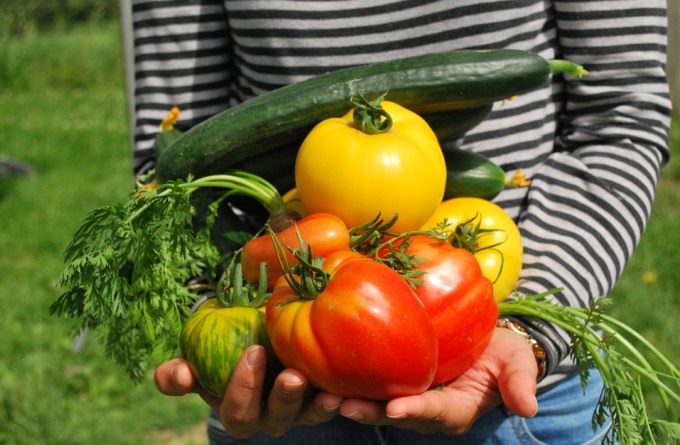Steps for Growing Food In Your Balcony This Summer

The luxury of gardening in vast spaces spread with grass, or having a backyard to plant your favourite plants is a thing of the past. In an age of apartments with little space dedicated to this long forgotten activity, perhaps what we need is some creativity and an accommodating spirit.
Whether you have a balcony or a little corner around the windowsill, growing edible herbs and small plants can be a rewarding experience. We walk you through the process, so it becomes even more easier for you.
Steps for growing food in your balcony are as follows:
1. Find a pot to plant in
Buying expensive flower pots or vases is fine when you have money to spare. But a more economical and environmental (Reduce, reuse, recycle, remember!) option is to look for used jars, spare containers, pencil stands, old mugs or anything that arouses your interest. Even old trays will work, bottles and glasses, juice boxes, milk cartons. The sky is the limit!
Recycle what you can, making sure the container or pot has drainage holes to let out excess water. If you cannot resist the fancy or are in the mood to decorate, there are ample options like these metal polka dot cups on Amazon for example. To save up on space, purchasing hanging pots also serves as an excellent idea!
2. Choosing the right variety of edible herbs
There are scores of options to pick from, but with temperatures shooting up in Delhi, you have to be careful what and where you plant. Summer plants best suited for the scorching heat include cabbage, okra, chilly pepper, bitter gourd, and cucumbers among others. Lemons, guavas and pomegranates are all good in the sun. Tomatoes, bitter gourd, sweet potatoes, spinach are all excellent options, provided you can clear up some space.
Balconies and rooftops can be converted into your own personal food project by combining organic vegetables, handy herbs and pretty little flowers. Creepers and vines are also a great idea to cover up bare walls, they provide greening of vertical spaces and require minimal caretaking! Tomatoes, various types of beans (lablab, runner, pole) will all contribute to your meal.
3. Obtaining and sowing the seeds
You can save seeds from tomatoes, melons, and other fleshy fruits and dry them out in the sun, or simply contact the local gardener to help you out. Most colonies will have a person on a cycle coming every Sunday trying to encourage you to plant flowers. It’s time to use him!
Depending on the type of plant you are growing, you can either grow transplants indoors and transfer them into the pot or purchase them straight from a nursery to avoid the fuss. Some seeds can be sowed directly, like beans, carrots, spinach. Moisture is essential, especially in the start. Watering them in while the sun is at its peak is no good, wait until the weather is pleasant in the late afternoon or evening time.
Once your plant starts yielding you fresh fruits and vegetables, herbs and flowers, all of the work you put in will be worthwhile! Growing your own food will reduce the amount of pesticide you consume, and also the visits to the supermarket.
4. Tending to the plant
The important thing to remember is to plant according to the weather. Potting the plant is careful business, and requires a fair amount of precision. Once you fill the container with a soil-compost mixture, make sure it has been cleared of insects. If you’re looking at buying compost in bulk, you can get 5 kg manure for about 350 on Amazon. Instead of using pesticide sprays, a greener option is neem oil.
Gardening aids in boosting mental health and improves physical activity on a day to day basis. The satisfaction of even a minimal produce brought about by your hard work will give you unparalleled satisfaction. Apart from relieving stress, it adds to our nutrition levels too. A balcony garden, no matter how small, will instill a sense of healthy living in our lives. Your lifestyle choices also might inspire your friends and family, and can help propagate community farming.
“Backyard gardening can inspire you to take an interest in the origins of your food and make better choices about what you put on your plate,” says Dr. Helen Delichatsios, an internist at Harvard-affiliated Massachusetts General Hospital. “When you grow your own food, you savor it more because of the effort it took to get to the table.”
Growing your own food, or even part of it, is a unique way of relishing the small joys of life and bringing about some peace in our chaotic lives, all while promoting healthy living. What can be better than a fresh plate of salad on a summer afternoon, with home-grown tomatoes, plucked at a moment’s notice? The earthy flavour of curry leaves in your meal, or just-picked mint in your evening tea, these are the priceless benefits of growing your own food garden in your balcony.




Great, my plants were all dead once because I kept giving them rejected RO water. In vasant kunj, we have high salt in water. Now my plants are happily drinking RO water!
Why not grow assorted veggies and eat them live of the shelf!! 🙂
thank u, i grow my farm on the common terrace of the colony and we have cherry tomatoes that the entire building likes to enjoy.
great article. When u grow veggies, grow tulsi with them and it will help keep infection away
Hi, I am growing a balcony farm and it is more rewarding than you would normally think.